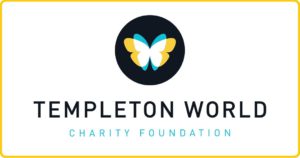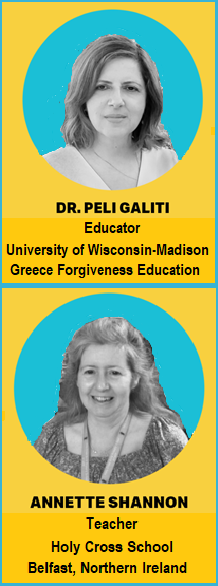Tagged: “family”
TIME Magazine: Forgiveness is One of Mankind’s Most Important Innovations
Calling forgiveness one of mankind’s “most important innovations,” TIME magazine is doubling down on its 22-year infatuation with the moral virtue by declaring, “Beset by a global plague, political turmoil, and social reckonings, it’s time for forgiveness to go viral.”
The internationally acclaimed news publication first introduced the science of forgiveness to its readers on March 28, 1999, in an essay titled “Should All Be Forgiven?” That widely-cited introductory overview of forgiveness—one of the first ever in a publication designed for the general public—helped usher in a plethora of forgiveness-related articles since then that reported on the superabundance of new research projects focused on forgiveness.
“In the past two years, scientists and sociologists have begun to extract forgiveness and the act of forgiving from the confines of the confessional, transforming it into the subject of quantifiable research,” the TIME article in 1999 sermonized. “In one case, they have even systemized it as a 20-part ‘intervention’ that they claim can be used to treat a number of anger-related ills in a totally secular context. In short, to forgive is no longer just divine.”
The “20-part intervention” in the TIME quote (above) is a reference to the Enright Process Model of Forgiveness that was just being developed at that time by Dr. Robert Enright, a University of Wisconsin-Madison clinical psychology professor and forgiveness researcher. Dr. Enright had founded the International Forgiveness Institute four years earlier.
For his leadership work with that early model and for his development of innovative forgiveness interventions, TIME magazine crowned Dr. Enright “the forgiveness trailblazer.” Shortly after receiving that recognition, The Los Angeles Times editorialized that Dr. Enright is “the guru of what many are calling a new science of forgiveness.” The Christian Science Monitor called him “the father of forgiveness research.”
Fast forward 22-years and you will discover an updated and enthusiastic TIME magazine essay with this headline: “After a Year That Pushed Us to the Brink, It’s Time for Forgiveness to Go Viral.” The dictionary definition of “going viral,” of course, is when an idea is of such significance that it spreads quickly and widely on the Internet. In this case, it also refers to the actual implementation of that idea which is described in the article much like a miracle cure:
“It is a powerful solution backed up by both cutting edge neuroscience and age-old wisdom. It leads to greater cooperation, eases conflict, increases personal happiness, lowers anxiety and is completely free. It’s called forgiveness.”
One of the studies cited in this latest article is a comparison of various forgiveness interventions. Among those available for testing, the study concludes, Dr. Enright’s interventions are the most effective. “Using theoretically grounded forgiveness interventions is a sound choice for helping clients to deal with past offenses and helping them achieve resolution in the form of forgiveness,” according to the study. “. . . the advantage for individual interventions was most clearly demonstrated for Enright-model interventions.” (Efficacy of psychotherapeutic interventions to promote forgiveness: a meta-analysis)
That recent TIME article also makes a direct comparison between the success of the forgiveness coalition and the “mindfulness and meditation” movement:
“Like forgiveness, mindfulness and meditation have been shown in many circumstances to reduce stress levels, mitigate heart disease, and lower blood pressure. Can we create the same level of cultural penetration for forgiveness? Our future may well depend on it. Beset by a global plague, political turmoil, and social reckonings, it’s time for forgiveness to go viral.”
The latest TIME article was authored by Andrew Serazin, President of the Templeton World Charity Foundation and Chair of the Forgiveness Forum, a series of global conversations on the mental and physical health benefits of forgiveness.
Editor’s Note: To illustrate the dramatic upward trajectory of the forgiveness movement, when Dr. Enright began exploring the social scientific study of forgiveness in 1985, there were no published empirical studies on person-to-person forgiveness. Today there are more than 3,000 published articles on that subject according to the National Institutes of Health (NIH), many of them authored by Dr. Enright during his 35+ years of forgiveness research and intervention ingenuity.
- Read the full TIME article: “After a Year That Pushed Us to the Brink, It’s Time for Forgiveness to Go Viral.”
- Read the full March 28, 1999 TIME article: “Should All Be Forgiven?”
World Education Week Features Dr. Enright’s Forgiveness Education Initiatives
World Education Week 2021, an annual celebration of practical educational innovations that kicks off this week, will focus on Dr. Robert Enright’s Forgiveness Education initiatives—particularly those in Greece, Northern Ireland, and Liberia (West Africa).
The event, sponsored by the Templeton World Charity Foundation, provides a platform for schools and education organizations to share how they have developed their expertise with the express purpose of inspiring other schools and organizations to understand the journey to excellence. More than 100 schools and organizations around the world will be sharing their unique expertise and success stories with a global audience.
 “The best thing we can do to build a better future is empower our students with the social and emotional tools they will need to live healthy, productive, thriving lives,” according to Andrew Serazin, President of Templeton World Charity Foundation. “Forgiveness is one of those critical tools.”
“The best thing we can do to build a better future is empower our students with the social and emotional tools they will need to live healthy, productive, thriving lives,” according to Andrew Serazin, President of Templeton World Charity Foundation. “Forgiveness is one of those critical tools.”
As outlined on the World Education Week website, Forgiveness Forum, a panel of experienced forgiveness teachers and educational advocates from around the world will share their unique experiences building forgiveness into curriculums and discuss its impact on classroom dynamics, on student attainment outcomes, and on teacher well-being.
Two members of that three-person panel of experts have a combined 20 years of experience either teaching students or educating teachers about Dr. Enright’s Forgiveness Education Program:
- Dr. Peli Galiti,
 Ph.D., M.Ed., has been conducting training workshops for Greek teachers for the past 9 years and has trained more than 600 teachers to use Forgiveness Education. The Program is now being taught to more than 6,000 students as part of the Greek Forgiveness Education Program that Dr. Galiti directs.
Ph.D., M.Ed., has been conducting training workshops for Greek teachers for the past 9 years and has trained more than 600 teachers to use Forgiveness Education. The Program is now being taught to more than 6,000 students as part of the Greek Forgiveness Education Program that Dr. Galiti directs.
. - Annette Shannon, Learning Support Teacher at Holy Cross Girls’ School in Belfast, Northern Ireland, has been teaching and coordinating the school’s Forgiveness Education Program for the past 11 years.
Another prominent participant in World Education Week, Bishop Kortu Brown, Chairman/CEO of Church Aid Inc., has been National Coordinator of the Liberia Forgiveness Education Program since it was established by Dr. Enright nearly 10 years ago. Bishop Brown also appears in a 30-second promotional video about the week’s activities.
The widely acclaimed Forgiveness Education Program, developed by Dr. Enright along with collaborating curriculum experts and experienced teachers, is administered by the International Forgiveness Institute. Using children’s story books and Social Emotional Learning (SEL) techniques, the Program teaches students about the five moral qualities most important to forgiving another person–inherent worth, moral love, kindness, respect and generosity. The Program is now being used in more than 30 countries around the world.
Learn more and register for World Education Week activities (all sessions are free) on the Forgiveness Forum website.
Which is harder, to forgive close family members or to forgive strangers?
In my experience, it is much harder, on the average, to forgive close family members. This is the case because those close to us are supposed to love us and not treat us deeply unjustly. There can be a deep sense of betrayal when someone, who is supposed to love us, acts very unjustly. As one more point, the answer to your question also depends on how serious the injustice is from the family member and from the stranger. If the stranger’s injustice is horrific, then this person will be harder to forgive than family members who do not act nearly as unjustly.
I grew up in a household in which my parents got angry quickly and expressed their anger often. I am about to get married. What cautions do you see for me?
I would recommend that you have a discussion with your future marriage partner about the kinds of patterns that occurred in each of your families of origin. Try to see the woundedness that was expressed in each family. This is because both of you might reproduce those patterns of woundedness with each other in the years to come. Your being aware of the wounds in your parents (and siblings), as well as your own woundedness from these, may help both of you from inadvertently passing those wounds onto each other. Each of you forgiving family members for giving you wounds should help in this regard. I wish you the best in your upcoming marriage.
My partner keeps saying that I am “morally superior” because I forgive. He does not mean this in any positive sense. He is using it as an insult. How do you recommend that I respond?
I would say something such as this: “Yes, forgiveness is a moral issue and so, yes, I am showing moral behavior toward you.” Yet, as the philosopher Joanna North has said in a philosophy journal article, when people forgive, they lower themselves in humility so that each person can meet person-to-person. So, yes, forgiving is an admirable moral response, but it does not suggest domination of the other at all.



